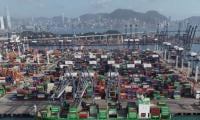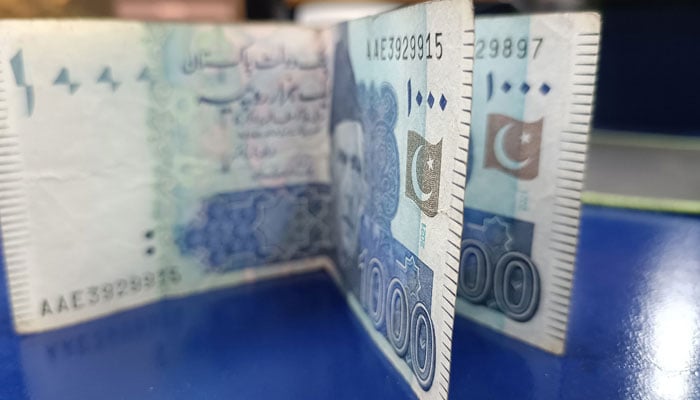Riba-free economy: Challenges and benefits
Country has integrated Islamic banking but conventional banking still holds significant share
ISLAMABAD: While Pakistan has made significant strides in promoting Islamic banking and Shariah-compliant finance, the full implementation of a Riba-free economy is a work in progress, with the goal of achieving it by 2028.
The country has successfully integrated Islamic banking into its financial system, but conventional banking still holds a significant share. Pakistan’s transition to a Riba-free system will require structural changes, increased public awareness, and continued support from financial authorities, the banking sector, and Shariah scholars.
According to the projections of the State Bank of Pakistan, the current share of Islamic banking stands at 20 percent which may grow to 30 percent in next year 2025.
However, Dr Nadeemul Haq, Vice Chancellor of Pakistan Institute of Development Economics (PIDE), said that for Riba-free economy, Pakistan will have to develop economy based on the shareholding mechanism with an elaborate monitoring system. It will have to develop a Riba-free stock exchange market where government bonds would also make business. However, he said it is an uphill task.
Dr Nadeem also stressed to re-define the word Riba, disclosing that he developed the Islamic tool for stock exchange in Iran which is successfully in operation. However, the experts say, the removal of Riba (interest) from Pakistan’s financial system, scheduled for January 2028, would have profound and far-reaching implications for the country’s economy. The transition to a Riba-free system, while in line with Islamic finance principles, could lead to both challenges and opportunities.
Riba-free banking, or Islamic banking, is primarily associated with Muslim-majority countries, its presence and growth in Western countries has been expanding, particularly as Islamic finance becomes more globalised.
The UK is one of the most advanced Western countries in terms of Islamic finance. The UK government has actively supported the growth of Islamic banking and finance through regulatory frameworks that allow for Shariah-compliant products. The UK has fully operational Islamic banks like Bank of London and the Middle East (BLME), Al Rayan Bank, and Abu Dhabi Islamic Bank (ADIB). In addition, some major conventional banks, such as HSBC and Barclays, offer Islamic banking windows that provide Shariah-compliant products, including Murabaha, Ijara, and Mudarabah.
The financial sector in Pakistan, they said, will need significant restructuring. Interest-based banking will be replaced by Islamic banking principles, focusing on profit-sharing, leasing (Ijarah), and partnership (Mudarabah, Musharakah) models. This will require banks and financial institutions to develop expertise in Islamic finance products, which could take time and resources. New financial products like Sukuk (Islamic bonds), Islamic insurance (Takaful), and equity-based financing mechanisms will have to be expanded to meet the demand of businesses and consumers.
The sudden shift may create short-term turbulence in the financial system. Businesses and investors who rely on conventional debt financing might struggle to adjust, potentially leading to reduced investment and lower economic growth initially. Over time, the shift could lead to more sustainable economic practices. Interest-free financing can reduce the risk of financial crises linked to excessive borrowing and debt. The emphasis on profit-sharing and equity financing can lead to a more risk-balanced economy, encouraging entrepreneurship and innovation.
With the removal of Riba, there is a focus on financing that is asset-backed (such as real estate, businesses, and other tangible assets). This shift can lead to increased investment in productive sectors of the economy, as speculative financial instruments like derivatives may become less common.
However, Pakistan’s reliance on conventional debt, including international bonds, may decrease as the government shifts towards Islamic financing tools like Sukuk. This could reduce debt servicing costs, as Islamic bonds generally offer more favorable terms compared to traditional debt instruments. However, the government will need to develop a robust market for these products.
Conventional foreign loans, including those from international financial institutions, may require renegotiation or restructuring, especially if interest-based repayments are no longer permissible under Islamic law.
More importantly, Islamic finance principles encourage the participation of a wider segment of the population, especially those who avoid conventional banking due to religious reasons. By removing Riba, financial inclusion can increase, as Islamic finance offers alternatives to interest-based products that are seen as unethical by certain sections of society.
Profit-sharing and equity-based finance structures can lead to more equitable wealth distribution. The focus on shared risks and rewards might reduce economic inequality over time, but this is dependent on effective implementation.
The removal of Riba could influence inflation and interest rates in unpredictable ways. In the short term, Pakistan may experience higher borrowing costs for some sectors as the Islamic finance market is established. However, if equity-based financing gains ground, it could lead to more efficient allocation of capital and better control of inflation.
The central bank would need to develop new tools for controlling inflation and managing the money supply without relying on interest rates. This could include targeting inflation through liquidity management or using Islamic financial instruments like Murabaha (cost-plus financing).
Islamic finance structures often support SMEs more effectively than traditional debt-based systems. In the absence of Riba, businesses may find it easier to access financing through Musharakah or Mudarabah (profit-sharing) arrangements, which could encourage entrepreneurship and innovation.
On the flip side, small businesses that are heavily reliant on interest-based financing might face difficulties adjusting, as the availability of financing could become more limited initially. Coming to foreign relations and international trade, Pakistan’s relationship with international financial institutions, especially those that adhere to Western financial models, could be affected. Countries with Islamic financial systems, like Saudi Arabia, Malaysia, and United Arab Emirates, could strengthen trade ties, but Western financial markets may view this shift with caution. However, Pakistan can attract increased foreign investment from countries that support Islamic finance. This could open doors to new economic partnerships and bolster the country’s foreign exchange reserves.
The government and its entities started in 2017 using Islamic financial tools to generate the financing for its projects. In 2017, Wapda issued a Sukuk bond worth Rs200 billion (approximately $1.25 billion) to finance its major hydropower projects, particularly for the Dasu Hydropower Project and other ongoing energy infrastructure development.
The Sukuk were asset-backed, secured by the revenue generated from the Tarbela and Mangla dams, which are two of Pakistan’s largest and most significant hydropower projects. The federal government also issued Sukuk bond in 2017 and then in 2020, which was part of the government’s ongoing strategy to diversify its sources of financing. This Sukuk was issued to secure financing for energy and infrastructure projects.
The government has increasingly relied on Sukuk as a debt restructuring and financing tool, particularly to generate funds for infrastructure development, including the construction of highways, power plants, and other key sectors.
-
 Eric Dane’s Friends Initiate GoFundMe To 'support' His Two Daughters After His Death At 53
Eric Dane’s Friends Initiate GoFundMe To 'support' His Two Daughters After His Death At 53 -
 Internet Erupts After Candace Owens Claims Elon Musk And Sam Altman Are ‘not Human’
Internet Erupts After Candace Owens Claims Elon Musk And Sam Altman Are ‘not Human’ -
 Will Princess Beatrice, Eugenie Stay In Contact With Andrew? Source Speaks Out
Will Princess Beatrice, Eugenie Stay In Contact With Andrew? Source Speaks Out -
 ‘AI Revolution Is Coming Fast & US Has No Clue,’ Bernie Sanders Warns Of Speed Of Disruption
‘AI Revolution Is Coming Fast & US Has No Clue,’ Bernie Sanders Warns Of Speed Of Disruption -
 Hong Kong Touts Stability,unique Trade Advantages As Trump’s Global Tariff Sparks Market Volatility
Hong Kong Touts Stability,unique Trade Advantages As Trump’s Global Tariff Sparks Market Volatility -
 ‘Miracle On Ice’ Redux? US Men Chase First Olympic Hockey Gold In 46 Years Against Canada
‘Miracle On Ice’ Redux? US Men Chase First Olympic Hockey Gold In 46 Years Against Canada -
 Friedrich Merz Heads To China For High Stakes Talks In An Effort To Reset Strained Trade Relations
Friedrich Merz Heads To China For High Stakes Talks In An Effort To Reset Strained Trade Relations -
 Astronauts Face Life Threatening Risk On Boeing Starliner, NASA Says
Astronauts Face Life Threatening Risk On Boeing Starliner, NASA Says -
 Hailey Bieber Reveals How Having Ovarian Cysts Is 'never Fun'
Hailey Bieber Reveals How Having Ovarian Cysts Is 'never Fun' -
 Kayla Nicole Looks Back On Travis Kelce Split, Calls It ‘right Person, Wrong Time’
Kayla Nicole Looks Back On Travis Kelce Split, Calls It ‘right Person, Wrong Time’ -
 Prince William And Kate Middleton Extend Support Message After Curling Team Reaches Olympic Gold Final
Prince William And Kate Middleton Extend Support Message After Curling Team Reaches Olympic Gold Final -
 Nvidia CEO Praises Elon Musk, Calls Him An ‘extraordinary Engineer'
Nvidia CEO Praises Elon Musk, Calls Him An ‘extraordinary Engineer' -
 Shia LaBeouf's Mugshot Released After Mardi Gras Arrest On Battery Allegations In New Orleans
Shia LaBeouf's Mugshot Released After Mardi Gras Arrest On Battery Allegations In New Orleans -
 Timothee Chalamet Felt '17 Again' After Reunion With 'Interstellar' Director Christopher Nolan
Timothee Chalamet Felt '17 Again' After Reunion With 'Interstellar' Director Christopher Nolan -
 Conan O'Brien Speaks First Time After Rob Reiner's Killing
Conan O'Brien Speaks First Time After Rob Reiner's Killing -
 Giant Tortoise Reintroduced To Island After Almost 200 Years
Giant Tortoise Reintroduced To Island After Almost 200 Years




